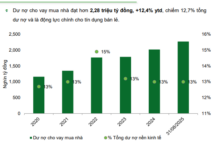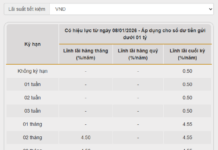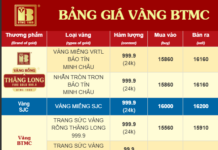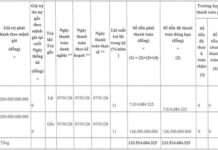This event offered crucial insights into the potential of receivables financing, along with feasible solutions and orientations to make receivables financing a popular financial tool that effectively supports businesses and the economy.
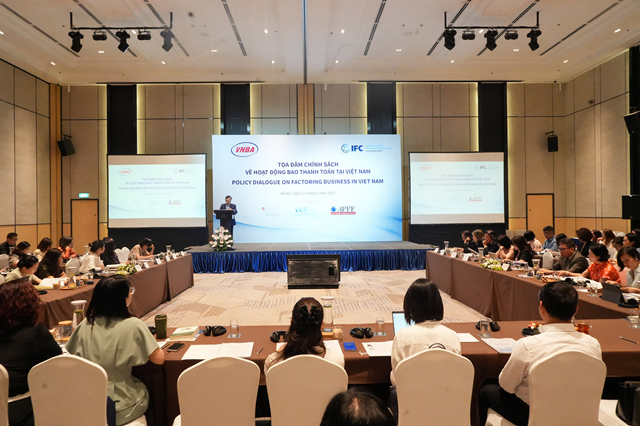
Talk show scene
|
In his opening remarks, Dr. Nguyen Quoc Hung, Vice Chairman and General Secretary of VNBA, emphasized that receivables financing is an essential financial tool that helps businesses, especially small and medium-sized enterprises (SMEs) and import-export enterprises, improve cash flow and expand their production and business activities without collateral. Receivables financing has been widely deployed and has achieved high efficiency in many countries in the region.
Although the legal framework has been improved with the amended Law on Credit Institutions and Circular No. 20/2024/TT-NHNN, in Vietnam, the outstanding balance of receivables financing is only about VND 16,000 billion, a very small proportion compared to the total outstanding balance of the whole system of nearly VND 17 million billion. This indicates that the potential for developing receivables financing in Vietnam remains vast.
Currently, banks and credit institutions are deeply interested in this topic, especially in the context of credit being under pressure. Receivables financing is an effective tool to support customers in accessing financial resources in a safer and more sustainable way.
The doctor also suggested that credit institutions should proactively research the tool of receivables financing, not only from the perspective of financial products but also as a solution to support businesses and promote the economy, especially in the context of Resolution 68-NQ/TW on developing the private economy has just been issued with many financial and credit support mechanisms. In the coming time, there is still much room for the development of receivables financing, especially with the deeper involvement of international financial institutions.
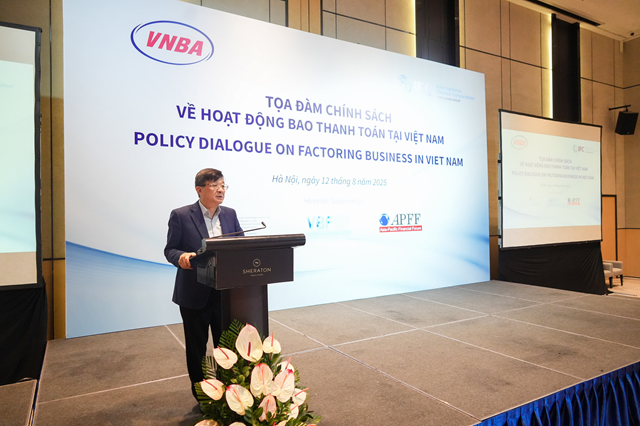
Dr. Nguyen Quoc Hung, Vice Chairman and General Secretary of VNBA, gave a speech at the talk show
|
At the talk show, Mr. Jinchang Lai, Chief Expert of the Advisory Group for Asia-Pacific Financial Institutions, IFC, said that to facilitate the development of receivables financing, it is necessary to use uniform international language and standards and review the limitations in the legal mechanism to avoid competitive disadvantages.
Receivables financing should include full elements such as credit guarantees and lockbox account mechanisms, which are international standards but are not yet prescribed in Circular 20. In addition, the management of systemic risk should be the responsibility of the management agency, while ordinary business risk belongs to the financial institution.
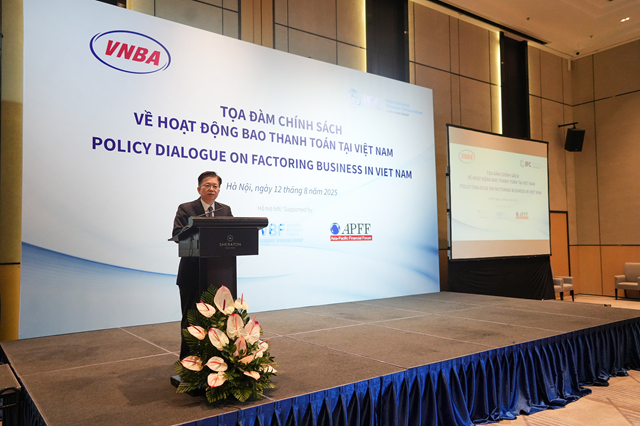
Mr. Jinchang Lai, Chief Expert of the Advisory Group for Asia-Pacific Financial Institutions, IFC, shared at the talk show
|
According to Ms. Phan Thanh Nga, Product Expert of Vietcombank, the total outstanding balance of global receivables financing is currently growing steadily at 8% per year. However, despite the large room for development, the total value of Vietnam’s receivables financing transactions accounts for only 0.12% compared to the Asia-Pacific region.
Ms. Nga also proposed adjusting the definition of receivables financing to be in sync with international practices, applying the mechanism of non-recourse by phase, and loosening credit conditions to increase SMEs’ access to capital.

Ms. Phan Thanh Nga – Product Expert of Vietcombank
|
At the talk show, Ms. Lai Minh Thuy (Citibank Ho Chi Minh City Branch), representing the group of foreign banks, shared three main obstacles in implementing receivables financing in Vietnam, including regulations on contracts and KYC, credit assessment, and cross-border receivables financing.
Accordingly, Ms. Thuy proposed adjustments to the KYC process and credit assessment to be in line with international practices and resolve issues related to foreign loan registration and currency limits.

Ms. Lai Minh Thuy (Citibank Ho Chi Minh City Branch), representing the group of foreign banks
|
Ms. Nguyen Thi Quynh Nga, Director of Products and Solutions of Techcombank, said that SMEs are currently facing significant challenges in working capital and collateral, often in a weak position when negotiating with partners. Receivables financing helps overcome this by pricing receivables based on the buyer’s reputation, improving cash flow, and expanding business.
Circular 20 has many new points, such as expanding the subject to resident and non-resident customers, flexibility in foreign currency, relaxing the purpose of capital use, extending the maximum term to one year, and supplementing electronic receivables financing, syndicated loans, and related services. However, some difficulties remain, including the demand for non-recourse receivables financing and accounting obstacles from the customer side and the difficulty of checking duplicate mortgage receivables, assessing non-resident customers, the lack of uniform international standards, and some forms are less applicable.
Ms. Nga proposed applying international practices, improving the legal framework for import-export receivables financing, allowing flexible assessment and limit approval, building a receivables database, the Ministry of Finance issuing unified accounting guidance, guiding business with non-resident customers, and promoting digitalization through e-invoices, digital contracts, blockchain, and centralized data management.
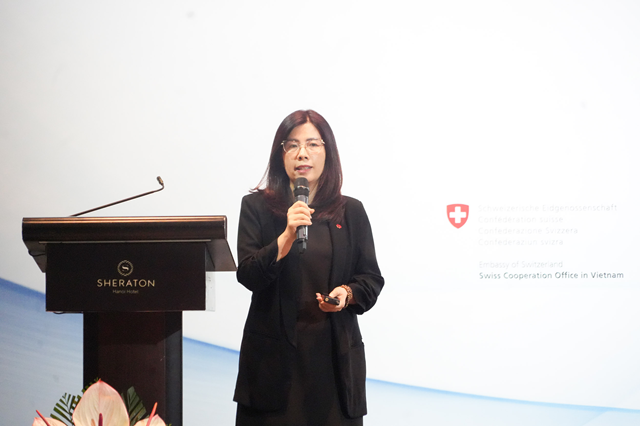
Ms. Nguyen Thi Quynh Nga, Director of Products and Solutions of Techcombank
|
At the talk show, banks raised many practical situations arising in LC and guarantee transactions according to Circular 20, Circular 39, and related documents, such as customers canceling transactions at the last minute even though the LC has been issued, causing risks in recovering advanced money; technical problems or customer changes that delay payment progress; banks advance money to the seller but the buyer loses the ability to pay, generating risks of non-guarantee. The opinions requested to clarify and unify the regulations between domestic regulations and international practices because some provisions of Circular 20 are not synchronous.
At the discussion session, the experts agreed on four key legal issues that need to be prioritized: clarifying the ownership of receivables when the seller goes bankrupt; handling the anti-assignment clause in the sales contract so that it does not apply to receivables financing; ensuring the right of the receivables financing unit to directly recover debts from the buyer; and determining the priority order of payment when disposing of secured assets.
These are fundamental issues, more important than technical details. If not thoroughly resolved, the field of receivables financing will hardly develop. To do this, experts said that coordination is needed between the State Bank, the Banking Association, judicial agencies, and the business community. Regarding IFC, it is necessary to continue the dialogue and provide technical support to promote the completion of the legal framework in the coming years.
– 10:47 14/08/2025
The Race to the Top: How Vietcombank, MB, VPBank, and HDBank Soar After a 50% Cut in Reserve Requirements
The decision by the State Bank of Vietnam to reduce the mandatory reserve ratio by 50% for credit institutions participating in the restructuring process has provided a significant liquidity boost for the four banks involved in the transfer. This policy move has had a multifaceted impact, simultaneously reducing funding costs, directly enhancing liquidity, and promoting credit growth.
“Vietnam’s Central Bank Meets With Commercial Banks to Discuss Interest Rates”
The State Bank of Vietnam (SBV) has instructed credit institutions to follow the directives of the Government, the Prime Minister, and the SBV itself, with a key focus on maintaining stability in deposit interest rates. Institutions are also encouraged to further reduce operating expenses, embrace digital transformation, and be prepared to share a portion of their profits to lower lending rates.
The Bank’s Endeavor to Lower Interest Rates
The Central Bank, in a bid to heed the Government and Prime Minister’s directive on enhancing measures to reduce interest rates, convened a meeting with the credit institution system on August 4, 2025. The primary focus of this gathering was to discuss strategies for stabilizing deposit rates and reducing lending rates.
“Unlocking Economic Growth: Vice Premier Advocates for Higher Credit Limits for Well-Performing Banks.”
“Regarding the credit growth cap, or ‘room’, as Deputy Prime Minister Ho Duc Phoc stated, this tool remains a vital lever in the short term for managing the economy. Adjusting this credit room is essential in the current context. Well-performing banks should be given more room to extend credit and boost the economy with much-needed capital.”





